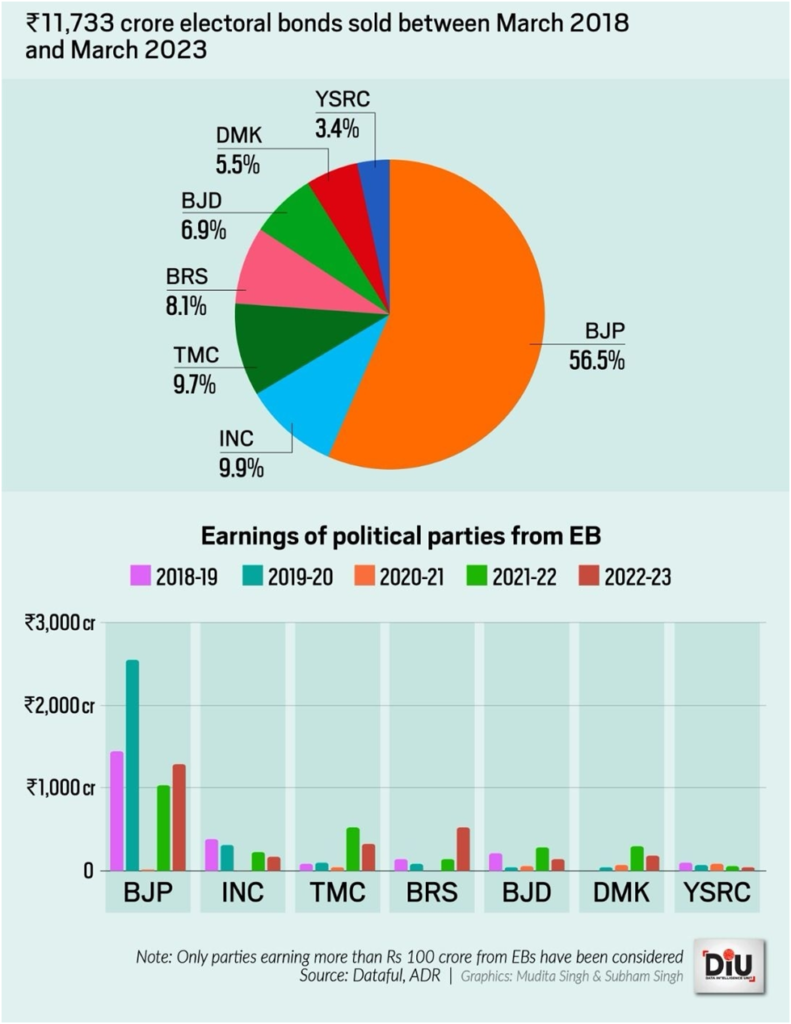Up till the preceding fiscal year, all political parties got more than Rs 12,000 crore in total, with the BJP collecting about 55% of this sum, or about Rs 6,565 crore.
Latest News Updates : According to the data available, electoral bonds have given more than Rs 16,000 crore to different political parties up to this point, with the BJP reportedly receiving a substantial bulk of these contributions. Up to the most recent fiscal year, all political parties earned more than Rs 12,000 crore from the 2018 election bond program, which has since been canceled.
The Association for Democratic Reforms (ADR) and the Election Commission’s records indicate that the ruling BJP earned nearly half of this sum, or about Rs 6,565 crore.
Party-wise statistics will be made accessible later in the fiscal year 2023–2024 following the filing of annual audit reports. According to the Association for Democratic Reforms (ADR), a total of Rs 16,518.11 crore was raised through the selling of electoral bonds between March 2018 and January 2024.
It is estimated that these bonds make up more than half of the entire amount that the parties have received. This figure surpasses ninety in the case of several regional parties. More than half of the BJP’s revenue also comes from electoral bonds.
In the last year of UPA-II, the BJP surpassed the Congress to become the wealthiest party in the nation, with a total income of Rs 673.8 crore in 2013–14 as opposed to the Congress’s Rs 598 crore. With a few exceptions, the Congress has seen a decrease in revenue since then, while the BJP has seen a general increase.

The BJP’s revenue increased significantly in the 2018–19 fiscal year, going from Rs 1,027 crore to Rs 2,410 crore—more than twice as much as it had previously. Following the introduction of electoral bonds, this was the first fiscal year in its entirety. The income of the Congress also increased significantly, from Rs 199 crore to Rs 918 crore.
Nonetheless, the BJP earned a total of Rs 2,360 crore in the most recent fiscal year, 2022–2023, of which roughly Rs 1,300 crore came from electoral bonds. With Rs 171 crore coming from electoral bonds, the Congress’s overall revenue dropped to Rs 452 crore. Election-related funds for the BJP increased from Rs 1,033 crore in 2021–22, while those for the Congress decreased from Rs 236 crore.
Through these bonds, other parties including TMC, BRS, DMK, BJD, and TDP obtained, respectively, Rs 325 crore, Rs 529 crore, Rs 185 crore, Rs 152 crore, and Rs 34 crore in the previous fiscal year. Through electoral bonds, neither the Samajwadi Party nor the Shiromani Akali Dal received any funding.
Almost half of the financing for electoral bonds come from corporations; the remaining portion comes from “other sources.” The electoral bonds program for political financing was declared illegal by the Supreme Court due to constitutional infringement of the right to knowledge and the freedom of speech and expression.
As financial tools for political contributions, electoral bonds provide the donor with anonymity because the buyer or payee’s name is not printed on them. Bonds are offered in denominations of Rs 1,000, Rs 10,000, Rs 1 lakh, Rs 10 lakh, and Rs 1 crore, with the highest denomination being the most popular. There is no upper limit to the quantity of bonds that one can buy or contribute.
These bonds are only available for purchase through a few State Bank of India offices, and political parties have 15 days to redeem them. The money goes to the PM National Relief Fund if it isn’t redeemed.

